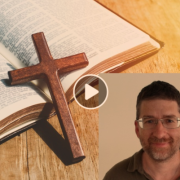During this season of Easter, as the Church celebrates the breaking forth of New Creation, I’ve had occasion to reflect on the relationship of God’s Kingdom to this world. In an interview with Uri Brito about my book Saints and Scoundrels, Uri asked me about Christ’s statement “My Kingdom is not of this world” and how this should inform our thinking about Christendom. Here’s a transcript of Uri’s question followed by my reply (to listen to the entire interview, click here):
Uri: “At the end of the chapter [on Herod the Great], you talk about the way Christ’s Kingdom makes a difference for the physical world in which we live, and you write the following: ‘While many have supposed Christ’s coming to be something that changes people’s hearts but makes no difference to the public order, this was not the hope of the Jews. Had they expected that kind of a kingdom, Herod may not have lifted an eyebrow when the news reached him that the Messiah had been born in Bethlehem. As it was, however, Herod knew what Zechariah knew and had prayed about, that when the Messiah came, the game would be up to the tyrants like himself and a new order of justice and peace would be introduced.’ This is really a fascinating statement with several implications. Could you tell us a little more about what you had in mind when you wrote those words and how how exactly Christ’s Kingdom is for this world. And I ask this because I know many people believe that when Jesus said ‘my kingdom is not of this world’ in John 18, that He was dispelling any notion that his kingdom was an earth-centered reality.”
Robin: Yes, that’s a really good question. My thinking when I wrote that was how Christ’s kingdom relates to the idea of Christendom, which is a reality for this age and which touches every aspect of life. That is quite controversial right now, because many people think that Christendom is a bad thing. And the history of Christendom in the last two thousand years is a very checkered one. I wouldn’t want to sin the sin of hypocrisy that has often emerged from people trying to defend and build Christendom. But at its root I think it’s totally spot on to say that Christ’s kingdom has implications for every area of life, and that it is a public, tangible, visible reality that transforms the world. That was the Jewish hope of the Messiah – that he would transform the physical world and deal with sin and death on every level, not just make a way for people to have personal salvation so they can escape from this earth, but bring creation to the earth. That was at least the Old Testament picture of the Messiah, which many Jews understood despite the misunderstands that were prevalent in the Second Temple Period about the work of the Messiah.
“So I actually think Christendom is a good thing. People will quote John 18:36, ‘My kingdom is not of this world.’ It’s actually helpful to realize that a more accurate translation of the original Greek is ‘My Kingdom is not from this world.’ I got this from one of Tom Wright’s excellent essays on Paul, and he points out that while Christ’s kingdom does not arise from this world, but from heaven, it comes to the earth, so Christ’s Kingdom is very much of and for this world. That’s how the Lord taught us to pray: ‘They Kingdom come, they will be done, on earth..’ So Herod the Great and the tyrants of this world are correct in fearing the Messiah because he does come to defeat sin in a tangible and public way.
“I’m trying to get away from the pietistic and Gnostic idea that Christ’s kingdom is just about our spiritual interiority. I think theologies like dispensationalism contribute to that because you have artificial demarcations between the physical work of God in the Old Testament and the supposedly merely spiritual work in the New Testament , which kind of mitigates the tangible significance of Christ’s kingdom in the here and now.
I just have to qualify myself here, because a lot of people, when you start talking like this, they hear you calling for some sort of Christian theocracy or something political. And that’s often why people have reacted to the idea of Christendom. We certainly do not want to make the mistakes of many of the Jews in the Second Temple period where they were expecting a purely political messiah. But here’s the point: just because Christ does not come as a political king – at least not yet – does not mean that His kingdom has no relevance to what happens in the here and now in the physical earth. So while His kingdom is about much more than what happens on the earth, it isn’t about less. One of the people who really understood this – who I profile in the book, just jumping ahead a bit – is William Wilberforce. I talk about him in Chapter 11, because he put into practice this idea that God’s kingdom has relevance for the here and now. And this motivated him in his campaign to abolish slavery – first the slave trade and then slavery – from the empire. And he did this just through steady faithfulness day in and day out.”
Further Reading
- Triniy Talk Interview: Saints and Scoundrels with Robin Phillips
- Is Jesus’ Kingdom of this World?
- Salvation as Escape from the Body (Gnosticism and Evangelicalism, part 1)
- Resurrection and the Sanctification of Matter (Gnosticism and Evangelicalism, part 2)
- Raised a Spiritual Body (Gnosticism and Evangelicalism, part 3)
- Building for God’s Kingdom (Gnosticism and Evangelicalism, part 4)
- Your Day Job is Your Ministry (Gnosticism and Evangelicalism, part 5)
- Gnosticism in the Work Place (Gnosticism and Evangelicalism, part 6)


